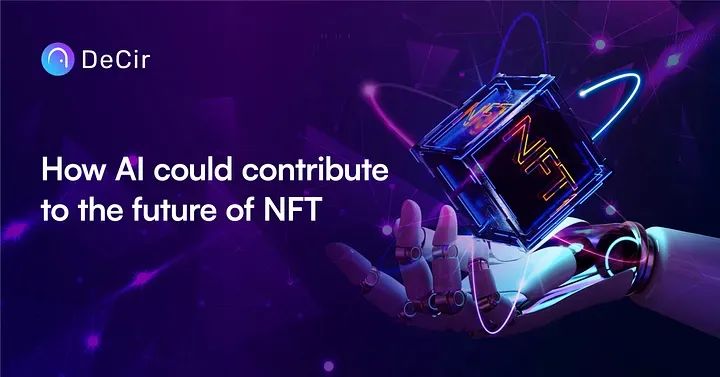How can AI open up incremental markets for NFTs?
How can AI expand NFT markets?Original author: DeCir.io
Non-fungible tokens (NFTs) have gained significant attention in recent years, revolutionizing the digital art and collectibles market. As this technology continues to develop, the adoption of artificial intelligence (AI) brings exciting possibilities for the future of NFTs.
In summary:
- AI can generate original digital artwork, verify its authenticity, and enhance curation and recommendation systems.
- Based on artist reputation, market trends, and historical sales data, AI-based models can provide accurate valuations, helping artists and collectors make informed decisions.
- Integrating AI into the NFT market can improve search functionality, introduce reputation systems, and enhance security.

- Is Tesla losing favor? Ark Invest shifts focus to cryptocurrency market, betting on Coinbase and Robinhood
- Exploring Do Kwon’s “New Home”: Overcrowded Balkanspaz Prison
- Volatility Shares will launch the first leveraged bitcoin futures ETF next Tuesday.
Content Generation and Creativity
AI has a significant impact on NFT content generation and creativity. AI algorithms can generate unique and original digital artwork, pushing the boundaries of artistic expression.
By utilizing machine learning techniques, AI can learn and analyze patterns from existing artwork and create new works that fit an artist’s style or a specific theme. The fusion of human creativity and AI computational power will produce a plethora of novel and engaging NFT works.
Authenticity Verification and Traceability
One fundamental challenge that the NFT space faces is verifying the authenticity and traceability of digital assets. AI plays a crucial role in addressing this issue. By adopting computer vision and image analysis algorithms, AI can detect and track unique features in digital artwork, creating verifiable digital fingerprints.
This ensures NFTs’ tamper-evident nature, reliably tracing their origin and ownership, and enhancing trust and transparency in the ecosystem.
Authenticity Verification and Provenance
One of the fundamental challenges in the NFT space is verifying the authenticity and provenance of digital assets. Artificial intelligence can play a crucial role in addressing this problem [1]. By adopting computer vision and image analysis algorithms, AI can detect and track unique features in digital artworks, thereby creating verifiable digital fingerprints.
This can ensure that NFTs remain tamper-proof and can be reliably traced back to their source and ownership, enhancing trust and transparency in the ecosystem.
Planning and Personalized Recommendations
In the vast NFT market, discoverability is crucial. AI-driven recommendation systems can provide personalized suggestions based on users’ preferences, past interactions, and browsing history, helping users navigate the space.
By analyzing vast amounts of data, AI algorithms can identify patterns, understand user behavior, and formulate tailored recommendations. This can improve the overall user experience, increase engagement, and foster exploration of new, exciting NFTs.
Pricing and Valuation
Determining the value of an NFT can be challenging due to various factors such as an artist’s reputation, scarcity, and market trends. AI-based pricing models can leverage data analysis and historical sales data to provide more accurate valuations.
These models can consider factors such as an artist’s previous sales, social media engagement, and market demand to offer insights into fair pricing. This AI-driven pricing mechanism can benefit both artists and buyers, allowing artists to better understand the value of their creations and buyers to make more informed investment decisions.
Enhancing the NFT Market
AI can fundamentally transform the NFT market experience by introducing innovative features and functionalities. Intelligent search algorithms can help users browse through vast collections of NFTs and filter based on specific criteria such as style, artist, or genre.
AI-driven markets can also incorporate reputation systems, where users can rate and review artists or sellers, providing valuable feedback to the community. Additionally, AI-based escrow systems can simplify transactions and enhance the security of NFT transactions, reducing potential fraud or disputes.
Conclusion
The future of NFTs holds tremendous potential, and the integration of AI technology can unleash new opportunities for artists, collectors, and enthusiasts. The ability to generate unique content, verify authenticity, plan personalized recommendations, determine fair pricing, and enhance markets, all through AI capabilities, perfectly aligns with the needs of the NFT ecosystem. By harnessing AI, the NFT industry can continue to flourish, fostering creativity and innovation in the digital art and collectibles market.
Reference
[1]https://rockcontent.com/blog/artificial-intelligence-algorithm/
[2]https://decir.io/challenges-facing-global-creators/
[3]https://www.fool.com/the-ascent/cryptocurrency/nft-marketplaces/
[4]https://decir.io/what-are-soulbound-tokens/
We will continue to update Blocking; if you have any questions or suggestions, please contact us!
Was this article helpful?
93 out of 132 found this helpful
Related articles
- Will the rebound of Bitcoin prompt large institutions to take action, and will the regulatory framework for cryptocurrency assets become a political achievement of the election?
- Weekly Selection | Multiple institutions apply for Bitcoin spot ETF; Wall Street-backed exchange EDX Markets to launch; Bitcoin rebounds to $30,000, did the old money enter the market?
- Bitcoin rebounds as hidden currents surge in the market
- Development trends of NFT trading market: multi-functional aggregation and multi-chain competition
- Financial giants flock to Bitcoin ETF: Making money is the real deal
- Early layout of BRC20, comparing three Bitcoin mnemonic wallets
- Why has Bitcoin returned to $30,000 and its market share soared?




